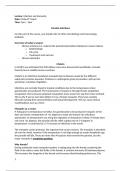Date: Friday 8th March
Time: 1pm – 2pm
Parasite Infections
For this part of the course, you should refer to Mims microbiology and immunology
textbook.
Overview of today’s session:
- Discuss protozoa (i.e. malaria) the parasite plasmodium falciparum causes malaria.
o Epidemiology
o Life cycle
o Treatments and vaccines
- Discuss Helminths
Malaria
In 2018 it was estimated that 228 million cases were documented worldwide, normally
found in low to middle income countries.
Malaria is an infectious Anopheles mosquito-borne disease caused by five different
eukaryotic protozoa parasites. Protozoa is a pathogenic group of parasites, split up into
sporozoan, amoebae, flagellates.
Infections are normally found in tropical conditions due to the temperature where
gametocides are produced. The transmission of malaria is through female anopheline
mosquitoes, this is because pregnant mosquitoes move away from sap from trees to blood.
This is why if you’ve ever been bitten it is by a female mosquito. They have complex
lifecycles varying from asexual division and sexual development. This can cause clinical
manifestations such as a fever.
Mosquito as a vector.
P. Falciparum is temperature sensitive, for gametocytes to be produced it requires 10-18
days and needs a temperature of >21 degrees to mate and mature into infectious
sporozoites. As temperatures are rising the migration of mosquitoes is likely. If climate does
not reach >21 degrees, the parasite will die. With a global rise of 2-3 degrees in
temperature, it could lead to a 5 % increase in infections in the world.
The mosquito carries protozoa, the organism that causes malaria. The mosquito is abundant
all over the world, however if the temperature is not high enough to sustain Anopheles spp
the parasite will die. There are more than 40 species that transmit the parasite, but the
major mosquito is anopheles gambiae.
Why female?
During mating the male mosquito transfers a mating plug into the female containing the
fluid of the male to meet the fluids of the female. It contains hormone 20-hydroxyecdysone.
This increases the longevity of the female and increases blood feeding preferences. This
1
, hormone also increases lipid transporters which facilitate plasmodium and prevents the
immune system from killing the parasite.
Disease pathology in humans
Fever and presence of Plasmodium species
- Asymptomatic – caused by any or all plasmodium species.
- Parasite is present in the patients’ blood.
Uncomplicated malaria
- presents with symptoms such as sweating, anaemia, diarrhoea etc.
Severe malaria
- severe anaemia causing organ damage, a coma, pulmonary complications,
hypoglycaemia, and acute kidney function.
- This may present with huge numbers of parasites circulating the blood.
Vulnerable people have low protection against the parasite, causing 1% of infections in
severe malaria. Severe malaria is deadly in 10% of children and 20% of adults due to
comorbidity.
Placental malaria
Pregnant women are susceptible to plasmodium spp, they can express receptors for the
parasite on the placenta. The placenta expresses VAR2CSA on surface of red blood cells
which travel through the placenta to the baby. Infection of red blood cells enables adhesion
to CSA leading to red blood cell sequestration in the placenta, allowing internalisation of that
organism. This is a huge risk to mother and foetus causing still births, delivery failure or
malnutritional and poor cognitive mobility of the baby. There is a huge mortality rate of
babies.
Natural immunity
Your red blood cells contain a Duffy antigen receptor. This is encoded on Fya and Fyb located
on chromosome 1 of your genome. P. vivax and P. Knowlesi interact with these Fya and Fyb
antigens of the Duffy blood group system.
In certain areas, people have found to have mutations of these genes:
1) Individuals with fya and fyb alleles
2) Duffy – individuals fy a- and b- do not express the Duffy antigen, meaning these to
variants are unable to get into the red blood cells. Therefore, these individuals are
resistant to infection of the plasmodium species.
If you do have the absence of a Duffy antigen, these individuals are more susceptible of HIV
infection as Duffy slows down the HIV infection. HIV can bind to white blood cells and infect
cd4 cells.
Human Lifecycle of P. Falciparum
Two videos are available on Moodle regarding the lifecycle.
2


